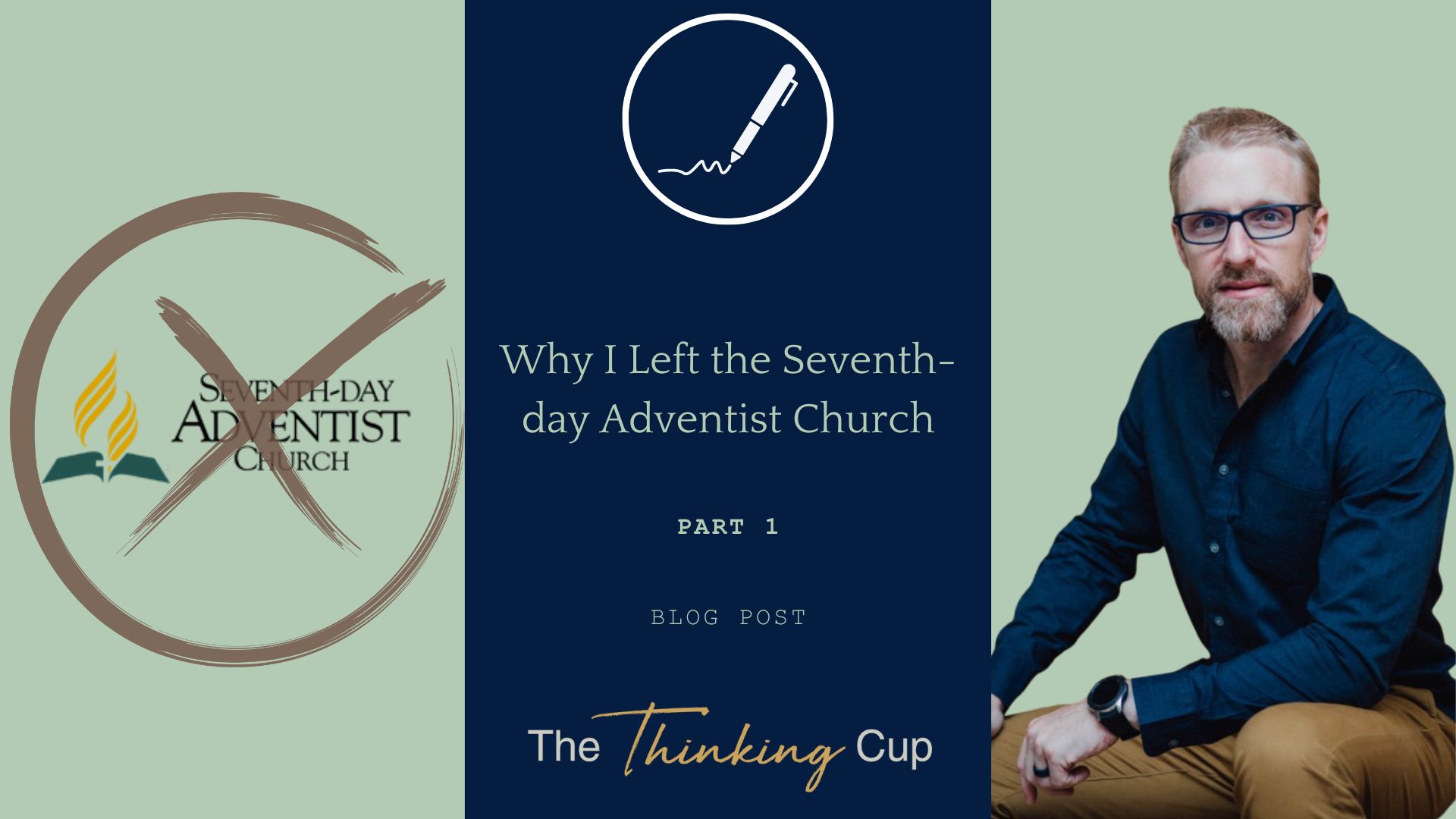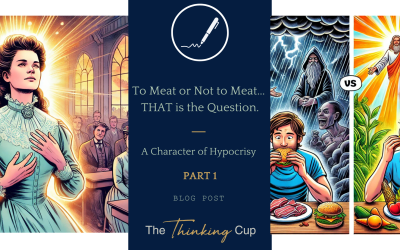Honestly, the last few days have been mentally tough. It’s difficult when we have dedicated our entire lives to the Seventh-day Adventist Church to be met with loss of friends, hostility, angst, and bitterness, all because we are convinced that many of the church’s beliefs don’t align with Scripture. Why do Adventists see you as part of the Remnant Club or not? Why do my parents and so many close ‘friends’ feel deep emotions of mourning and pain when they hear that our family has left the Adventist Church?
So you can understand some of the texts I have received from Adventist friends, family, blog readers, and church members, I’d like to share a few… Remember, these are all Adventists:

To top it all off, my family and I have already been verbally misrepresented from the pulpit by one of the Elders who served under my leadership when I was the Head Elder at our previous Adventist church. This was the direct quote in the first 5 minutes of his sermon:
“When I say a scattering, and I say, talk about a shaking, there’s some of us who sit here today if we aren’t in the Word, we will be shaken out of here and Out of God’s control. We recently had some things that some of you, most of us, know about in our church, and it’s a sad situation. It saddens my heart this morning. So I come to you this morning with a heavy, heavy heart, heavy heart for people who have decided they need to leave the church and for you who sit here today because without the hand of Jesus, without you diligently searching his words, without you giving your all to Jesus. You, too, can be shaken. I, too, can be shaken in searching for the truth. We can be shaken away from the word. So, my friend, I want to ask you an important question today: your life, your joy, your sorrow, for all eternity, depends on this answer. And I want to give you a moment to think about it. The question is, are you saved.”
I share these responses not to badger and shame the people who shared their concerns but to help understand the context of what happens when someone decides to step away from the Adventist Church. These types of responses have been confusing and complicated to take. Are we no longer considered Christian? Does the Adventist framework only play well with other Adventists? I know my parents love me deeply, but why the deep anguish? When our family loves the Lord with ALL our heart, mind, and soul. The feeling is eerily awkward, almost a type of spiritual funeral, almost like a dying-off of the ones who used to be unique, elect, and remnant. Now, all they can do is pray that we might ‘make it.
But I am reminded of Jesus’ words to His disciples in Matthew 10,
“Do not think that I have come to bring peace to the earth. I have not come to bring peace, but a sword. For I have come to set a man against his father, and a daughter against her mother, and a daughter-in-law against her mother-in-law. And a person’s enemies will be those of his own household. Whoever loves father or mother more than me is not worthy of me, and whoever loves son or daughter more than me is not worthy of me. And whoever does not take his cross and follow me is not worthy of me. Whoever finds his life will lose it, and whoever loses his life for my sake will find it.” [1]
Growing up in an Adventist Pastor’s Family in Michigan was one of my fond memories. My family was always focused on church and God, but I didn’t realize until I had children of my own the methods and framework in which this was done.
Adventism is a lifestyle and theological framework that must be considered as a whole. The pieces truly make up the whole. If any of the major pillars of Adventism is found to be on shaky ground and rooted in something other than the Bible, then it’s only a matter of time. It’s a house of cards. The entire system comes crashing down.
Christians have the vital responsibility to make the evaluation that the Apostle Paul calls for in his first letter to the Thessalonians:
“Do not despise prophecies, but test everything; hold fast what is good.” (1 Th 5:20–21)
As we move through life, we will encounter many conflicting teachings, doctrines, systems, religious teachers, and preachers. We cannot and should not avoid the need to think freely and test every doctrine, teaching, teacher, preacher, prophet, or prophetess with the word of God.
John writes in his first Epistle,
“Beloved, do not believe every spirit, but test the spirits to see whether they are from God, for many false prophets have gone out into the world. By this you know the Spirit of God: every spirit that confesses that Jesus Christ has come in the flesh is from God, and every spirit that does not confess Jesus is not from God. This is the spirit of the antichrist, which you heard was coming and now is in the world already.” (1 Jn 4:1–3)
This would be a good moment to pause and spend some time in prayer, asking for God’s guidance in understanding the true meaning of 1 John 4:1-3. What is the Biblical understanding of a false prophet? I encourage you to set aside any preconceived theological views you may have. Suppose the beliefs of the Adventist church are predicated on the proper understanding of the prophetic life of a woman in the late 1800s. In that case, it’s worth spending the time and effort to thoroughly compare your beliefs (as well as mine) with what the Scriptures actually say. Don’t just take my word for it. As you read these words, I pray it will be the start of a journey. Give yourself the freedom and permission to test what you believe truly. And allow yourself to turn away from any faulty understanding, doctrine, teacher, preacher, or prophet/tess.
On a journey like this, it’s important to affirm where our loyalty and devotion should be firmly planted:
“For true believers, loyalty is shown in our commitment to Jesus and His gospel (Mark 8:35; Romans 1:16). It is the acknowledgment that Jesus Christ is our sole source of authority and salvation (Matthew 28:18; John 14:6). Such devotion and commitment should echo the attitude of the apostle Peter, who said, “If anyone speaks, he should do it as one speaking the very words of God. If anyone serves, he should do it with the strength God provides, so that in all things God may be praised through Jesus Christ” (1 Peter 4:11).
As Jesus’ disciples, we demonstrate our loyalty and self-sacrificing allegiance to Him by following His command: “If anyone would come after Me, he must deny himself and take up his cross and follow Me” (Mark 8:34). But even when we fail to be completely loyal and steadfast to Him, we have His assurance that He will be loyal to us: “And surely I am with you always, even to the very end of the age” (Matthew 28:20b).” [2]
False doctrines often have some deviation from something that is good and honors the Scriptures and the Body of Christ. To adequately explain why my family and I are no longer part of the Seventh-day Adventist Church, I must start with the pinnacle and, most importantly, the teaching that makes a person an Adventist. Adventism has been the only framework through which I have seen the Bible, as I am a third and fifth-generation Adventist on my Dad’s and Mom’s sides, respectively. This framework is challenging to break out of because of the constant reinforcement of Adventist views and theology.
It’s hard to explain what this means for someone trying to interpret and understand scripture “biblically.” Every denomination in Christianity believes its doctrines are grounded in scripture, but this cannot be entirely true, as there are many differing interpretations and ideas.
We all have biases, and when we seek to understand the Word of God, we naturally tend to seek confirmation biases to affirm how we already see the Bible. This is not only true in Adventism but is intentionally emphasized and ingrained in what we read, study, listen to, etc.
Ellen Gould White is the most critical author and founding pioneer of the Seventh-day Adventist Church. It is an understatement to say that,
Adventism wouldn’t exist without the writings and teachings of Ellen G. White.”
According to the SDA Church, the writings of their prophetess, Ellen G. White, are not only ‘divinely inspired’ [3] and ‘correcting inaccurate interpretations of scripture.’ [4] But they also claim that she is the infallible interpreter of the infallible Bible.
In the June 3, 1971 issue of the Advent Review & Sabbath Herald, an official publication of the SDA Church, they state:
“One of his own number in studying the Bible arrives at conclusions differing from this body of believers. Investigation and discussion follow, strife and division ensue, and a council is called in the enclosure. The two factions are arrayed against each other. Each maintains his position, at least to his own satisfaction, from the Bible. A vote is taken on the question and a majority settle it for the enclosure. The minority settle it for themselves; a new sect is formed. The wall of prejudice is broken down as far as our inquirer is concerned, and once more he is turned loose upon the uncertain sea of investigation. This illustrates the fact that most denominations, at least, have no satisfactory court of final appeal, that while the Bible is infallible and is the basis of all Christian faith, it needs to be infallibly interpreted to avoid confusion and division.” [5]
They then go on to explain how the infallible Bible is infallibly interpreted:
“To be reliable, interpretation must come to us through the same channel through which came the Scriptures in the first place. But what is the channel through which Scripture came to us? “The testimony of Jesus,” or “the spirit of prophecy” (Rev. 19:10). It was the Spirit of Jesus that spoke through the prophets (1 Peter 1:10-11)… Thus the prophets have always been the living, active voice of God to His people, and the products of the prophets have always been the guide that alone the people could follow to sure success. This voice has always been its own interpreter.” [6]
The Seventh-day Adventist Church utilizes the term “spirit of prophecy” to refer to Ellen White’s writings. They believe Jesus is speaking through Ellen White with prophetic authority no differently than through the prophets of scripture. Thus, her commentary on any passage is the infallible interpretation of God himself. She is seen as the stamp of approval for the correct interpretation of scripture.
They then follow up with:
“Thus when we can find in the writings of Isaiah or Jeremiah something that explains some statement in the writings of Moses, when a writer of the New Testament explains a passage in the Old Testament, this is accepted, not as a private interpretation, but as settling all dispute, because the interpretation came through the same source, or channel, as the words for which the meaning is sought.
Thus, Protestants have always claimed that the Bible is its own interpreter. Perhaps it is better to say the spirit of prophecy (we use the term here as synonymous with the gift of prophecy), or testimony of Jesus, is its own interpreter.” [7]
Because Ellen White supposedly had the “spirit of prophecy,” a term they have mis-defined and misplaced, her interpretation settles all disputes as the correct one.
In their April—June 1976 Sabbath School Quarterly, another official organ, they state:
“How advantaged the Seventh-Day Adventist Church is to have a modern inspired interpreter of both the Old and New Testaments! Surely there is every logical reason to give the inspired interpretation top priority in arriving at our understanding of the Word today.” [8]
Many Seventh-Day Adventists will vehemently deny that the SDA Church teaches this, but it is evident how the church holds her interpretation in high regard. Why would the marketing arm of the church put out publications that state these things and never recant from them if they didn’t believe it to be true? The SDA Church teaches that the infallible Bible cannot even be correctly understood apart from the infallible interpretation of Mrs. White, which is supposedly the equivalent of the prophets of old commenting on any given passage. She is supposed to be the antidote to theological division that supposedly plagues Protestantism—despite the SDA Church being rife with theological division themselves.
As I mentioned earlier, when you read the Bible through the lens of the Adventist Worldview, you are taught to see, understand, and engage in the text with specific ideas already present in your mind. This is reinforced by the requirement to see Ellen G. White as the inspired interpreter of everything. However, challenging this belief can be empowering, as it allows for the development of your own unique understanding and interpretation of the text. It’s not about arriving at the same ideas, but about finding your own voice in the conversation.
Many Adventists claim that their beliefs are only based on the Bible and provide proof texts to show how they are Sola Scriptura. However, it’s crucial to encourage critical thinking and independent interpretation in religious studies. The problem lies in how the church sees the text and teaches the layperson to view it as from Ellen G. White and/or some of the other founding patriarchs of the Adventist church, rather than encouraging individual exploration and understanding.
As I have clearly stated, the Seventh-day Adventist church holds Ellen G. White as the only infallible interpreter of Scripture. As I have carefully studied her writings and put her statements under the microscope of research, I have concluded that not only is she unreliable in her interpretations, but she is a heretical false prophet that teaches a different Jesus Christ, a different gospel, a different form of salvation through a mixture of faith + obedience, works based requirements of health and perfection of character, unbiblical atonement and sanctuary doctrines, dangerous prophecy teachings, and an all-around unbiblical teacher to be used as an interpreter of scripture.
As you look into how Ellen G. White viewed her writings, you will see that she saw herself as inspired and expected others to see her writings the same way. She openly claimed that the Holy Ghost was the author of the Scripture as well as her writings:
“Scripture and Spirit of Prophecy Have Same Author—The Holy Ghost is the author of the Scriptures and of the Spirit of Prophecy. These are not to be twisted and turned to mean what man may want them to mean, to carry out man’s ideas and sentiments, to carry forward man’s schemes at all hazards.” —Letter 92, 1900. [9]
She believed that her writings should take the same status as the authors of the Bible.
“In ancient times God spoke to men by the mouth of prophets and apostles. In these days he speaks to them by the testimonies of his Spirit. There was never a time when God instructed his people more earnestly than he instructs them now concerning his will and the course that he would have them pursue.” —Testimonies for the Church 5:661. [10]
It is important to note that Ellen White referred to her writings as the testimonies and the Spirit of Prophecy.
If a person claims that the Holy Ghost inspires their writings and they carry the same weight as the prophets and apostles in the Bible, we can safely conclude that she thought of her own writings with the same authority as the Bible. It does seem odd that she then claims that her writings are the ‘lesser light.” How could her writings be less when she claims the same authority as the Scripture and the Adventist church states that one should use her as the only infallible interpreter of the Bible?
She goes on to state exactly how she wanted others to read and use her writings:
“We must follow the directions given through the spirit of prophecy. We must love and obey the truth for this time. This will save us from accepting strong delusions. God has spoken to us through His word. He has spoken to us through the testimonies to the church and through the books that have helped to make plain our present duty and the position that we should now occupy. The warnings that have been given, line upon line, precept upon precept, should be heeded. If we disregard them, what excuse can we offer? [11]
She also clarified that no other person or author had the ability or authority she had. And if you read something that contradicts her thoughts as the inspired pen of God, you should ‘believe them not!’
You think individuals have prejudiced my mind. If I am in this state, I am not fitted to be entrusted with the work of God. But as this matter has been brought before my mind, in other cases, where individuals have claimed to have messages for the Seventh-day Adventist Church, of a similar character, the word has been given me, “Believe them not.” “I have not sent them, yet they ran.” [12]
This is the unfortunate reality of Adventism. In the late 1800s, a human being who claimed to be the Spirit of Prophecy, a term strictly reserved for the Holy Spirit / Testimony of Jesus, claimed to be the mouthpiece of God for a small group of people. Ellen White required that this group follow her guidance and chastised anyone who wouldn’t submit to her authority.
“If you seek to turn aside the counsel of God to suit yourselves, if you lessen the confidence of God’s people in the testimonies He has sent them, you are rebelling against God as certainly as were Korah, Dathan, and Abiram.” [13]
This forced authority was supposedly because nothing she wrote could be done without the Holy Spirit’s help.
“I cannot at my own impulse take up a work and launch out into it. I have to be impressed by the Spirit of God. I cannot write unless the Holy Spirit helps me. Sometimes I cannot write at all. Then again I am aroused at eleven, twelve, and one o’clock; and I can write as fast as my hand can move over the paper.—Letter 11, 1903.” [14]
She believed and taught that her writings were truth and that her dependence was only on the Spirit of the Lord himself!
“Although I am as dependent upon the Spirit of the Lord in writing my views as I am in receiving them, yet the words I employ in describing what I have seen are my own, unless they be those spoken to me by an angel, which I always enclose in remarks of quotation.” [15]
Since these statements are all from Ellen White herself if we can find anything that is untrue, items that come from other human authors, while she claimed them to be from God, or anything that is in direct opposition to the Bible, we can then throw her out entirely and claim that she is a false prophet that teaches a different gospel, a different Christ, and false doctrines.
Prophets are human, and yes, they do make mistakes, but when you claim, as Ellen White has, that EVERYTHING she has written is from God, and that she can’t write anything without the prompting of the Holy Spirit, she is clearly claiming her understanding and writings are directly from God and therefore shouldn’t have error. Especially the items that are spoken to her from God in vision!
Remember what John said,
“Beloved, do not believe every spirit, but test the spirits to see whether they are from God, for many false prophets have gone out into the world.” (1 Jn 4:1)
Over the next several articles, we will examine a few key discrepancies in her writings, literary borrowing, visions, and treatment of others during her life.
My hope and prayer is that you will test the Prophet. Do all of her writings bear the mark of God or of the Devil? After all, this is the exact claim that Ellen White makes,
“God does nothing in partnership with Satan. My work for the past thirty years bears the stamp of God or the stamp of the enemy. There is no halfway work in the matter. The Testimonies are of the Spirit of God, or of the devil. In arraying yourself against the servants of God you are doing a work either for God or for the devil.” [16]
The next post will begin our deep dive into shining light on the first major statement and vision from Ellen G. White that she claimed was from God. This statement turned out to be completely false and untrue, causing Ellen, in my opinion, to break the 9th commandment by bearing a false witness of God. You thought 1844 was important in Adventism? 1843 might be more important in unraveling the truth!
—————————————————————————————————-
Over the next several weeks and months, I will address some of my main objections to the doctrines of the Seventh-day Adventist Church, as stated in the official letter my family signed and turned in this last week to leave the SDA Church.
- Ellen G. White has the Gift of Prophecy and is used by the Church Proper as a Prophet who corrects faulty interpretations of Scripture.
- EGW theology and interpretation of Scripture are taught in ALL Adventist publications, including but not limited to the Sabbath School and all children’s class material.
- The Pre-Creation Great Controversy Theme
- Maintaining One’s Salvation Through Obedience to the Law (as taught by EGW)
- SDA Church being the Remnant Church
- Baptism into Christ is synonymous with Baptism into the SDA Church
- The Law of God (Ten Commandments) is eternal and binding on humanity
- The Sabbath is Eternal and still an obligation on believers
- The Sabbath is the Seal of God
- Sunday Worship is the Mark of the Beast
- Tithing is a biblical requirement
- Abstinence from certain meats and alcohol is biblically required
- Christ’s ministry in the ‘Heavenly Sanctuary’
- Death and the Afterlife (Adventist Soul Sleep)
- The Investigative Judgement Doctrine in its entirety
- The Scapegoat typifying Satan and thus all sins are placed on Satan before his demise
- Jesus is a Levitical Priest as portrayed in the Churches understanding of the Sanctuary in Heaven through Ellen White’s writings
- 1844 holding any importance in the Christian church or the work of redemption
- Adventist’s interpretation of Daniel and Revelation
- The understanding of Jesus and the Trinity through the writings of Ellen G. White
- The SDA interpretation of Daniel and Revelation inside the ‘End Times’ framework.
- The Adventist understanding of the Three Angels Message
- The intentional emphasis on the “Everlasting Gospel” (the Three Angels Messages) is a more important and pressing message than the Gospel of Jesus Christ
I hope these future topics and articles will be a resource for research and study. Don’t take my own study as truth; test it against the word of God!
In Christian Love,

Reference Cited:
[1] The Holy Bible: English Standard Version (Wheaton, IL: Crossway Bibles, 2016), Mt 10:34–39.
[2] Got Questions Ministries, Got Questions? Bible Questions Answered (Bellingham, WA: Logos Bible Software, 2002–2013).
[3] Conference of SDA, “Statement of Confidence in the Writings of Ellen G White – Adventist.Org.”
[4] Conference of SDA.
[5] Owen, “The Advent Review & Sabbath Herald, June 3, 1971, Vol. 148, No. 22.”, Pg. 5
[6] Owen., Pg. 5
[7] Owen. Pg. 5
[8] Pedersen, “God Is Not Silent.”, Pg. 92
[9] Ellen Gould White, Selected Messages From the Writings of Ellen G. White, Book 3 (Review and Herald Publishing Association, 1980), 30.
[10] Ellen Gould White, Selected Messages From the Writings of Ellen G. White, Book 3 (Review and Herald Publishing Association, 1980), 30.
[11] Testimonies for the Church, vol. 8 (Pacific Press Publishing Association, 1855), 298.
[12] Manuscript Releases [Nos. 19–96, 1941–1957], vol. 1 (Ellen G. White Estate, 1993), 298.
[13] Testimonies for the Church, vol. 5 (Pacific Press Publishing Association, 1855), 66.
[14] Ellen Gould White, Selected Messages From the Writings of Ellen G. White, Book 3 (Review and Herald Publishing Association, 1980), 49.
[15] Ellen Gould White, Selected Messages From the Writings of Ellen G. White, Book 3 (Review and Herald Publishing Association, 1980), 49.
[16] Testimonies for the Church, vol. 4 (Pacific Press Publishing Association, 1855), 230.




It is a powerful and vulnerable experience to open oneself up to the Holy Spirit and surrender our experiences, traditions, interpretations and routines up to Him. May His Spirit continue to lead and guide you and your family to Jesus as He is, not as who we thought Him to be.
Walking in fellowship with the Lord is our greatest joy.
Thank you for your thoughts! God is so faithful!
Very well written article. Looks like Chapter 1 of the book is done. This is going to be a very informative study. Keep up the good fight for the truth. You have many people praying for you as you do this work.
A book may be something in the future. Where God leads, I will go! 🙂